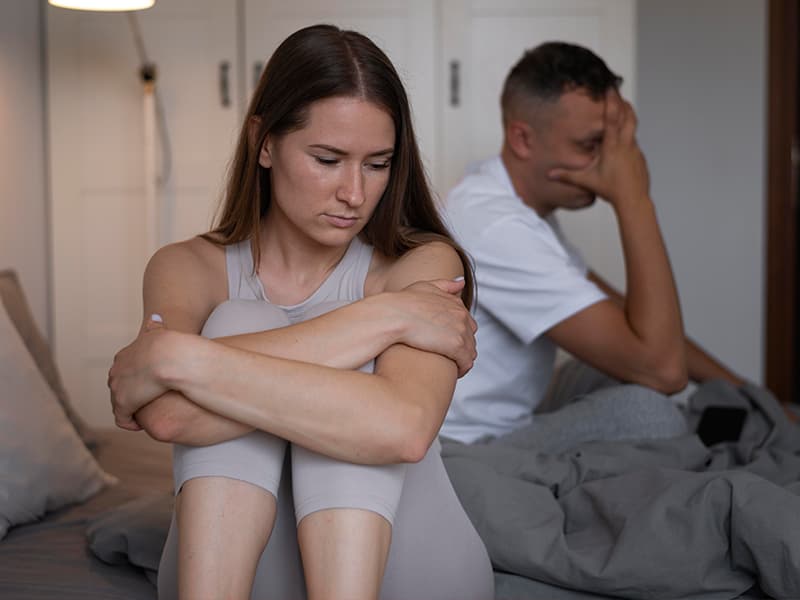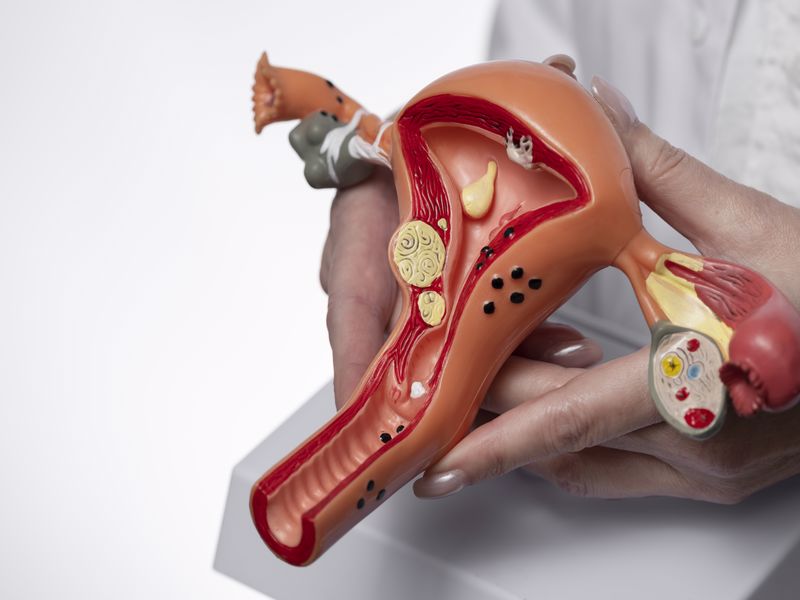Vaginismus is a common yet stigmatized sexual dysfunction. Embarrassment about discussing it, along with the misconception that only a few women experience it, can lead to delays in seeking treatment and negatively impact the recovery process.
What is Vaginismus?
Thanks to advancements in medical science, vaginismus is now a treatable condition with a near 100% success rate. Vaginismus can affect a woman's confidence, mental health, and even her relationship. Starting treatment with a qualified and experienced doctor can make the recovery process smoother.
Understanding Vaginismus
Just as various muscles exist throughout our body, the vagina also contains muscular tissue, which plays an essential role in urination and childbirth. In women with vaginismus, these muscles involuntarily tighten during sexual intercourse, often due to psychological or physical factors, making penetration difficult or even impossible.
Symptoms of Vaginismus
Vaginismus can manifest in various ways, and not all symptoms need to be present in every case. Some key symptoms include:
- Fear of being intimate with a partner and an inability to attempt penetration
- Involuntary muscle contraction, fear, and panic during attempted intercourse
- Dyspareunia (painful intercourse)
- Avoidance of intercourse after a painful initial experience
- Inability to open legs during intimacy, physical resistance (pushing away with hands or feet), or shifting position to avoid penetration
- Difficulty or inability to insert tampons
- Fear or discomfort with gynecological exams or vaginal ultrasounds
- Avoidance of viewing or touching one's own genital area
- Reluctance to allow a partner to touch the genital area
- Refusal to insert medications or suppositories into the vagina
- Limiting intimacy to only a few comfortable positions
- Periodic lack of arousal, vaginal dryness, or decreased sexual desire


What is First Night Anxiety?
First night anxiety is a condition often seen in newlyweds who have not previously had sexual experiences. It is a state of uncertainty and apprehension related to the anticipation of their first sexual encounter.
Causes of First Night Anxiety
The primary cause of first night anxiety is a lack of information. Additional factors include:
- Lack of knowledge
- Performance anxiety
- High expectations and societal pressure
- Emotional discomfort
- Fear of pain or discomfort
- Inexperience
- Cultural or religious taboos
Why Does First Night Anxiety Occur?
First night anxiety is often due to a lack of open communication between partners and misinformation about sexuality. Concerns over "performance" during the first experience are particularly common among men and may be compounded by fears of issues such as erectile dysfunction or premature ejaculation. Societal expectations can also place pressure on couples.
Entering into a sexual relationship requires trust and emotional bonding. When partners cannot openly discuss their expectations and feelings about intimacy, it can increase anxiety. Many women fear that their first experience will be painful, leading to further hesitation and reluctance. Additionally, fear of societal or familial reactions can create added pressure.
Which Doctor to Consult for First Night Anxiety?
For first night anxiety, consulting a gynecologist, urologist, psychiatrist, or psychologist can be beneficial. Identifying the specific concerns and seeking guidance from an appropriate specialist is essential. A gynecologist can explain what to expect in a reassuring manner, while a psychologist can help address emotional concerns. Sexual therapists, who are trained in issues related to sexual health and intimacy, can also provide specialized support to manage fears and anxieties around sexual encounters.
Symptoms of First Night Anxiety
First night anxiety can present differently for each individual, with common symptoms including:
- Anxiety and stress
- Sleep disturbances
- Stomach discomfort
- Irritability and restlessness
- Headaches, high blood pressure
- Lack of sexual desire
- Sweating, trembling, rapid heartbeat
- Emotional and communication issues
How to Overcome First Night Anxiety
Several methods can help reduce first night anxiety and make the experience more comfortable and enjoyable:
- Communication: Open, honest communication with your partner is essential. Share your concerns and expectations.
- Educate Yourself: Reading reliable sources on sexuality can help you and your partner gain a better understanding.
- Relaxation Techniques: Techniques such as yoga, meditation, or deep breathing can help ease tension.
- Build Emotional Connection: Spend quality time with your partner before intimacy. A romantic evening can strengthen emotional bonds and increase confidence.
- Set Realistic Expectations: Taking things slowly and communicating during the process can make it easier.
Tips to Ease First Night Anxiety
To alleviate first night anxiety, couples should openly share their fears with each other and support one another. If needed, consult a specialist. Replacing myths and misconceptions with accurate information from trusted sources can also be helpful. Sexual therapists or educational resources can provide reliable guidance.
Effects of First Night Anxiety on Sexuality
First night anxiety can impact sexuality by reducing sexual desire and increasing stress, potentially leading to issues such as erectile dysfunction in men or difficulty achieving orgasm and vaginismus in women. Anxiety can cause women to experience muscle tension or discomfort during intercourse, leading to physical problems and even avoidance of sexual activity.
Coping with First Night Anxiety
Couples can overcome first night anxiety by supporting each other and seeking constructive solutions. Relying on scientifically accurate information rather than hearsay is essential. Relaxing and focusing on enjoyable thoughts rather than fears can help. For added comfort during the first experience, products like lubricants may be useful.
Recognizing Vaginismus
If experiencing symptoms during or after intercourse, one may have vaginismus. Key symptoms of vaginismus include:
- Pain during intercourse
- Discomfort or pain during penetration
- Inability to engage in intercourse or undergo a pelvic exam due to muscle spasms or pain
- Pain when inserting a tampon during menstruation
- Reflexively pulling back or closing legs during intercourse
- Avoiding gynecological exams
- Panic during intercourse
- Inability to undergo a Pap smear due to pain
- Involuntary vaginal contractions during penetration despite no issues during foreplay
- Fear or difficulty with intercourse (dyspareunia)
- Partial or unsuccessful penetration during intercourse
- Pushing the partner away or resisting intimacy
- Fear of touching the genital area
- Limited to only one or a few positions during intercourse
- Lack of sexual desire, reduced arousal, or vaginal dryness due to pain and fear
If any of these symptoms occur, consulting a specialist is recommended.


How to Overcome Vaginismus
Individuals experiencing vaginismus symptoms may find it difficult to express or seek help for their condition. However, vaginismus is a treatable condition, and addressing it is essential for a fulfilling personal and social life. Untreated, it can disrupt not only intimate relationships but also other areas of daily life.
Vaginismus treatment is typically approached through behavioral and cognitive methods. Techniques such as finger exercises, sexual therapy, and emotional counseling are commonly used in treatment. If you’re exploring ways to address vaginismus, it’s best to consult with a gynecologist to determine the underlying causes and create a personalized treatment plan.
Treatment Options for Vaginismus
Vaginismus is both common and treatable. Women with this condition often experience lowered self-confidence, emotional distress, and their partners may also be negatively impacted. It’s important to start the treatment process with an experienced gynecologist without hesitation.
The treatment approach focuses on identifying the root cause and selecting the most appropriate therapy. Key treatment methods include:
- Sexual Therapy: Structured counseling to address psychological aspects of vaginismus.
- Exercises: Techniques to relax the pelvic muscles and reduce involuntary contractions.
- Botox Injections: Used in some cases to help relax vaginal muscles.
- Pulsed Radiofrequency Therapy: A newer treatment that may help by relaxing muscle tissues.
Important Points to Know About Vaginismus Treatment
Sexual intimacy is a vital part of marriage, and maintaining a healthy sexual life is important for a successful partnership. Many couples wonder if vaginismus treatment will work for them. It’s crucial to understand that vaginismus is a medical condition with effective solutions. Treatment duration varies by individual, with some seeing faster results than others, but with the right specialist and treatment approach, vaginismus can be resolved.
What to Expect After Vaginismus Treatment
The goal of vaginismus treatment is successful sexual intercourse. While pleasure may not be immediate in the initial months, intimacy becomes more comfortable over time, and pleasure and orgasm can occur naturally. Many patients express relief and surprise at how manageable the treatment process is, often saying, “I never thought it would be this easy.” Post-treatment, women generally experience a boost in self-confidence, and couples benefit from strengthened relationships.




